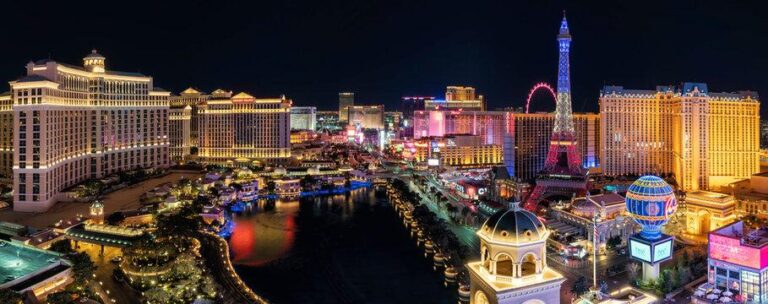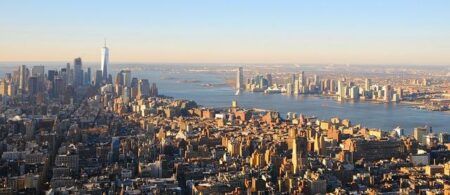Las Vegas at a Crossroads: Navigating Economic Shifts and Environmental Pressures
Transforming Tourism Dynamics and Economic Pressures
Once renowned globally as the premier entertainment destination, Las Vegas is experiencing a profound shift in its tourism profile. The conventional influx of affluent gamblers,who historically underpinned the cityŌĆÖs economy,is diminishing. Instead, younger generations prioritize immersive experiences such as music festivals, culinary adventures, and cultural events over conventional casino gambling. This evolution challenges the long-standing economic framework that has supported Las VegasŌĆÖs growth for decades.
Compounding these changes are lingering international travel restrictions and altered consumer habits following the COVID-19 pandemic, which have collectively dampened the flow of overseas visitors. Local enterprises that depend heavily on consistent tourist traffic are feeling the strain as a result.
Several critical elements are driving this transformation:
- Millennials and Gen Z travelers seeking diverse destinations,reducing Las VegasŌĆÖs exclusivity
- Emergence of new entertainment hubs across the United States intensifying competition
- Growth of online gambling platforms diverting revenue from physical casinos
- Inflationary pressures curbing discretionary consumer spending
| Industry Segment | Revenue in 2019 (Billion $) | Revenue in 2023 (Billion $) | Percentage Change |
|---|---|---|---|
| Casino Gaming | 6.5 | 5.3 | -18% |
| Hotels & Resorts | 4.8 | 4.1 | -15% |
| Entertainment & Events | 3.2 | 3.5 | +9% |
Water Scarcity: A Looming Threat to Urban Expansion
Las VegasŌĆÖs rapid growth is increasingly jeopardized by escalating water shortages. The cityŌĆÖs primary water source, the Colorado River, has been experiencing historic lows due to prolonged drought conditions and excessive consumption. This decline poses significant risks not only to residential water availability but also to the cityŌĆÖs ambitions for tourism and real estate development.
Urban development experts warn that without stringent water conservation policies and innovative resource management, Las VegasŌĆÖs expansion plans may need to be curtailed, perhaps limiting population growth and deterring new commercial ventures.
Key consequences of the water crisis include:
- Escalating water costs: Both households and businesses face rising expenses as water becomes scarcer.
- Regulatory constraints: Tighter restrictions on new construction projects to preserve limited water supplies.
- Environmental degradation: Ecosystems surrounding Lake Mead and downstream areas are suffering from reduced water levels and harsher conditions.
| Indicator | Current Measurement | Projection for 2030 |
|---|---|---|
| Lake Mead Water Elevation | 1,070 feet | 950 feet |
| Annual Water Allocation (acre-feet) | 300,000 | 230,000 |
| Population | 2.3 million | 2.7 million |
Challenges for Local Enterprises Amid Market Evolution
Small and medium-sized businesses in Las Vegas are confronting significant hurdles as consumer preferences evolve and operational costs rise. Many establishments that flourished during the cityŌĆÖs tourism boom now face shrinking profit margins due to more cautious consumer spending and a shift toward digital commerce.
Retailers and family-run businesses, in particular, struggle to compete with large online platforms and national chains, frequently enough lacking the capital to develop robust e-commerce capabilities or execute expansive marketing strategies.
Primary challenges include:
- Increasing commercial rents and utility expenses
- Supply chain interruptions causing inventory shortages
- Heightened competition from online retailers and big-box stores
- Declining pedestrian traffic in once-bustling shopping areas
| Industry | Year-over-Year Revenue Change | Adaptation Measures |
|---|---|---|
| Retail | -18% | Development of online sales channels |
| Food & Beverage | -12% | Expansion of takeout and delivery services |
| Entertainment | -25% | Hosting virtual and hybrid events |
Experts emphasize that businesses integrating digital platforms with traditional customer engagement stand a better chance of weathering these challenges. However, this transition requires both financial investment and technical know-how, which remain barriers for many smaller operators.
Innovative Strategies for Long-Term Resilience and Growth
In response to mounting environmental and economic pressures, Las Vegas is embracing forward-thinking strategies aimed at fostering enduring development. City officials and community leaders are prioritizing initiatives that balance ecological stewardship with economic diversification to reduce reliance on tourism.
- Advanced Water Conservation: Implementing smart irrigation systems and real-time leak detection to minimize water waste.
- Eco-Friendly Urban Planning: Increasing green spaces and enforcing sustainable construction standards to mitigate urban heat and improve air quality.
- Economic Diversification: Promoting growth in technology sectors, renewable energy industries, and the local arts scene to broaden the economic base.
Data-driven policies underpin these efforts, with measurable targets set for the coming years:
| Focus Area | Current Status | Goal by 2029 |
|---|---|---|
| Daily Water Consumption | 500 million gallons | 350 million gallons |
| Renewable Energy Usage | 15% | 45% |
| Tourism Revenue Dependence | 65% | 40% |
Looking Ahead: The Future of Las Vegas
As Las Vegas confronts a complex array of economic and environmental challenges, its ability to adapt will be critical in shaping its destiny. Stakeholders across the city are closely monitoring ongoing initiatives aimed at revitalizing the economy while safeguarding natural resources. The coming years will reveal whether this iconic desert metropolis can reinvent itself and sustain its global allure amid evolving realities.




